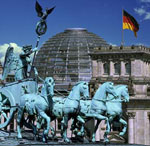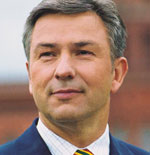
The new glass dome of the German Reichstag (parliament) seen from the top of the Brandenburg Gate, with the Quadriga in the foreground.

FRONT PAGE
About us

The 2010 results
The 2010 project
The 2010 finalists
Code of Ethics
The World Mayor Prize

The 2008 results
The 2008 project
The 2008 finalists
The World Mayor Award

The 2006 results
Methodology
The 2006 finalists
The World Mayor Award

The 2005 results
Contest methodology
List of finalists
The World Mayor Award

Mayor of Athens
Mayor of Guatemala City
Mayor of Mississauga
Mayor of San Fernando
Mayor of San Francisco

Mayor of Athens
Mayor of Guatemala City
Mayor of Mississauga
Mayor of San Fernando
Mayor of Vienna

Comments on finalists from The Americas
Comments on finalists from Europe
Comments on finalists from Asia, Australia and Africa
Comments on Addis Ababa
Comments on Antananariva
Comments on Athens
Comments on Atlanta
Comments on Belo Horizonte
Comments on Bonn
Comments on Guatemala City
Comments on Karachi
Comments on London
Comments on Melbourne
Comments on Mississauga
Comments on Rio de Janeiro
Comments on Rome
Comments on San Fernando
Comments on San Francisco
Comments on Toronto
Comments on Vancouver
Comments on Vienna

Mayor of Addis Ababa
Mayor of Antananarivo
Mayor of Athens
Mayor of Belo Horizonte
Mayor of Bonn
Mayor of Ekaterinburg
Mayor of Guatemala City
Mayor of Innsbruck
Mayor of Karachi
Mayor of Kiev
Mayor of Melbourne
Mayor of Mississauga
Mayor of Munich
Mayor of Rhodes
Mayor of Rome
Mayor of Tshwane
Mayor of Vienna

The 2004 contest
List of all 2004 finalists
Edi Rama wins 2004 award
People ask - Edi Rama replies
Why we voted for the Mayor of Tirana
Why we voted for the Mayor of Mexico City
History of Tirana

Front Page
Site Search
About City Mayors
The City of Berlin
Let me just say from the outset that being the Governing Mayor of Berlin is a great job. There are new challenges to meet every day, and the work is never dull.
More than anything, we owe this to Berlin itself, possibly the most exciting city in Europe. It is a young, lively, high-energy metropolis bursting with urban vitality, drawing to it young and creative people from all over the world. As a young fashion designer told me recently: ‘This city gives wings to the imagination.’
Some 15 years after the fall of the Wall, Berlin remains a city in flux. You can find something changing or emerging on almost every corner, transforming the face of the city on a daily basis. Our primary task in recent years has been to eliminate the scars left by the years of division. We have succeeded in that. The two halves of Berlin have grown together, both in appearance – since we have managed to close most of the gaps left in the cityscape – and from within. The people of our city no longer think in terms of East and West; they regard themselves as Berliners.
Of course, however, the decades of division in Berlin also created many problems that we are still grappling with today. For instance, Berlin is burdened by debts of more than €50 billion. Prior to unification, Berlin had been lavishly subsidised. Now, without these subsidies, we have to make up for budget shortfalls. And unemployment rates in the city are too high – primarily because 300,000 jobs have been lost in Berlin since reunification.
However, we are aware of our problems. I took office with the aim of bringing about a change in mentality here in Berlin. We are in the process of making fundamental changes in the city’s structure.
We have initiated a programme of strict budget cuts in order to put Berlin’s finances on a healthier footing. Our two-year budget for 2004/2005 shows that we are serious about this effort. I am also hoping, however, that the rest of Germany will support us in our attempt, and that is why I started an initiative this year to have Berlin’s position as the capital anchored in the German constitution.
We are taking this approach because Berlin’s identity as the country’s capital is unfortunately less self-evident than that of Paris, London, or Budapest in their own countries. After all, today’s Berlin is a very new capital – the government and parliament of the Federal Republic of Germany started its work here only five years ago. We hope that the people of Cologne, Hamburg, and Munich will start to view Berlin as being their capital too. That is one reason why Berlin is especially interested in demonstrating Germany’s vitality, cultural, scientific, and academic abundance, as well as economic strength. That is, I believe Berlin has an obligation to Germany to be a good capital city. A capital is a showpiece for an entire country. Many people abroad already know that: they say Berlin, when they mean Germany. What I am hoping for is a change in the way Berlin is viewed here at home, too – so that all Germans might be fully aware of their capital city as such.
At the same time, we have filed suit with Germany’s highest court, the Federal Constitutional Court, to have the federation assume €35 billion of Berlin’s debts. Only this will enable us to reduce our debt burden and give us back some room to manoeuvre. I do not mean, of course, that Berlin should simply stand back and wait to be helped. We have already accomplished a lot on our own. For instance, we have reached an agreement with civil service employees to reduce wages in exchange for time off. We have also withdrawn from the business of financing the construction of housing. No other German city and no other German state has even come close in the past to making the kind of budget cuts and instituting the kind of fundamental reforms that Berlin has. But we also need our country’s solidarity. I am sure that many of the world’s capital cities are poorer than Berlin. However, I doubt that there are many capital cities that are poorer than the rest of their own countries.
Nevertheless, we are not complaining. Berlin has incredible potential and capacity, something that is illustrated by our success in attracting several new companies and events to the city this year. MTV Central Europe, for instance, moved from Munich to premises on the banks of the Spree here in Berlin. We are building a new entertainment district in the former docklands area, and the Popkomm, one of the world’s largest music trade fairs, is being held in Berlin this year for the first time. And the film business is booming in the city. One example: just recently, Tom Cruise decided to shoot “Mission Impossible III” here. It may not be very modest to mention it, but I think I can take some of the credit for these successes. When I make official visits abroad, I “beat the drum” for Berlin, and when I talk to members of the business community, I make sure they know about the city’s great appeal, its superior quality of life, its affordable apartments and commercial properties, and the efficiency of its agencies responsible for assisting and promoting business.
With this in mind, I’d like to leave you with one thought: We have made good progress with Berlin in 2004. And I will keep working hard to ensure that our city is ready to meet the challenges of the future.


Klaus Wowereit, Mayor of Berlin and 2004 World Mayor finalist for Europe
Introducing
World Mayor 2006
The World Mayor project is now in its third year. As in 2004 and 2005, this year’s World Mayor will again be seeking out mayors who have the vision, passion and skills to make their cities amazing places to live in, work in and visit. The World Mayor project aims to show what outstanding mayors can achieve and raise their profiles. It honours those who have served their communities well and who have made contributions to the well-being of cities nationally and internationally. The most outstanding mayor of 2006 will be presented with the World Mayor award.
In 2004, Edi Rama, Mayor of Tirana, won the Award. The 2005 winner was Dora Bakoyannis, Mayor of Athens and now Greek Foreign Minister.
Between January and May each year, citizens from across the world are invited to nominate mayors for the World Mayor Award. They are also asked to provide reasons for their choice. After the close of the nomination stage, City Mayors, the organisers of the contest, prepare a shortlist of mayors who go forward to the second round of the World Mayor contest. In 2006, the list of finalists includes 50 mayors from North and South America, Europe, Asia, Australasia as well as Africa.
